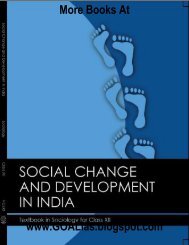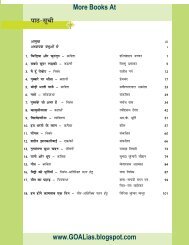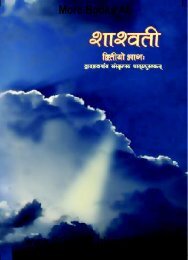t.com www.GOALias.blogspot.com www.GOALias.blogspot.com
t.com www.GOALias.blogspot.com www.GOALias.blogspot.com
t.com www.GOALias.blogspot.com www.GOALias.blogspot.com
- No tags were found...
You also want an ePaper? Increase the reach of your titles
YUMPU automatically turns print PDFs into web optimized ePapers that Google loves.
<strong>www</strong>.<strong>GOALias</strong>.<strong>blogspot</strong>.<strong>com</strong>66 Politics in India since IndependenceThe Constitutional principlesArticle 51 of the Indian Constitution lays down some Directive Principles of State Policy on‘Promotion of international peace and security’.“The State shall endeavour to –(a) Promote international peace and security(b) Maintain just and honourable relations between nations(c) Foster respect for international law and treaty obligations in the dealings of organisedpeople with one another; and(d) Encourage settlement of international disputes by arbitration.”How well did the Indian state live up to these principles in the first two decades afterIndependence? You may <strong>com</strong>e back to this question after reading the chapter.Cold War was just beginning and the world was getting divided intothese two camps. Did India belong to any of these two camps in globalpolitics of the fifties and the sixties? Was it successful in conductingits foreign policy peacefully and avoiding international conflicts?It’sthe fourth chapterand it’s Nehru onceagain! Was he asuperman or what? Orhave the historiansglorified his role?Policy of non-alignmentThe Indian national movement was not an isolated process. It was apart of the worldwide struggle against colonialism and imperialism.It influenced the liberation movements of many Asian and Africancountries. Prior to India’s Independence, there were contacts betweenthe nationalist leaders of India and those of other colonies, unitedas they were in their <strong>com</strong>mon struggle against colonialism andimperialism. The creation of the Indian National Army (INA) by NetajiSubhash Chandra Bose during the Second World War was the clearestmanifestation of the linkages established between India and overseasIndians during the freedom struggle.The foreign policy of a nation reflects the interplay of domesticand external factors. Therefore, the noble ideals that inspired India’sstruggle for freedom influenced the making of its foreign policy. ButIndia’s attainment of independence coincided with the beginning ofthe Cold War era. As you read in the first chapter of the book onContemporary World Politics, this period was marked by the political,economic, and military confrontation at the global level between thetwo blocs led by the superpowers, the US and the USSR. The sameperiod also witnessed developments like the establishment of theUN, the creation of nuclear weapons, the emergence of Communist
















